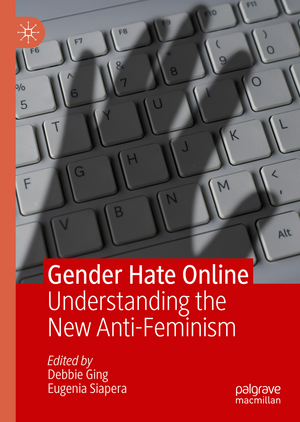Gender Hate Online: Understanding the New Anti-Feminism
Editat de Debbie Ging, Eugenia Siaperaen Limba Engleză Hardback – 24 iul 2019
This edited collection therefore addresses a substantial gap in scholarship by bringing together a body of work exclusively devoted to this topic. With perspectives from a variety of disciplines and geographic bases, the volume will be of major interest to scholars and students in the fields of gender, new media and hate speech.
Preț: 734.75 lei
Preț vechi: 896.04 lei
-18% Nou
Puncte Express: 1102
Preț estimativ în valută:
140.64€ • 152.82$ • 118.21£
140.64€ • 152.82$ • 118.21£
Carte tipărită la comandă
Livrare economică 21 aprilie-05 mai
Preluare comenzi: 021 569.72.76
Specificații
ISBN-13: 9783319962252
ISBN-10: 3319962256
Pagini: 294
Ilustrații: XXIV, 281 p. 33 illus., 31 illus. in color.
Dimensiuni: 148 x 210 x 29 mm
Greutate: 0.65 kg
Ediția:1st ed. 2019
Editura: Springer International Publishing
Colecția Palgrave Macmillan
Locul publicării:Cham, Switzerland
ISBN-10: 3319962256
Pagini: 294
Ilustrații: XXIV, 281 p. 33 illus., 31 illus. in color.
Dimensiuni: 148 x 210 x 29 mm
Greutate: 0.65 kg
Ediția:1st ed. 2019
Editura: Springer International Publishing
Colecția Palgrave Macmillan
Locul publicării:Cham, Switzerland
Cuprins
1. Introduction (Debbie Ging and Eugenia Siapera).- Part I. Theorising the New Anti-Feminism(s).- 2. Online Misogyny as Witch Hunt: Primitive Accumulation in the Age of Technocapitalism (Eugenia Siapera).- 3. Bros v. Hos: Postfeminism, Anti-Feminism and the Toxic Turn in Digital Gender Politics (Debbie Ging).- 4. Mera Internet, Meri Marzi: Alternative Imaginings of Consent in Pakistani Online Spaces (Nighat Dad and Shmyla Khan).- Part II. Manifestations of Online Misogyny: Case studies of different platforms and cultural contexts.- 5. Convergence on Common Ground: MRAs, Memes and Transcultural Contexts of Digital Misogyny (MacKenzie Cockerill).- 6. Black or Feminist: The Intersections of Misogyny, Race and Anti-Feminist Rhetoric Pertaining to the Bill Cosby Allegations (Sarah Anne Dunne).- 7. Cruel Intentions and Social Conventions: Locating the Shame in Revenge Porn (Rikke Amundsen).- 8. “Hell Hath No Fury….”: Gendered Reactions to the Cosby Mistrial Across Liberal and Conservative News Media Sites (Francine Banner).- Part III. Responses/resistance/experiences.- 9. Animating Feminist Anger: Economies of Race and Gender in Reaction GIFs (Rachel Kuo).- 10. Politics of #LoSha: Using Naming and Shaming as a Feminist Tool on Facebook (Arpita Chakraborty).- 11. Affective Resistance Against Online Misogyny and Homophobia on the RuNet (Tetyana Lokot).- 12. Feminist Tinder: Young Women Talk Back to Harassment Online (Laura Brightwell).- 13. “Should I Even Be Writing This?”: Public Narratives and Resistance to Online Harassment (Jasmine Linbarry and Bianca Batti).
Recenzii
“The book provides valuable ideas for social work professionals who are designing and managing strategies to fight gender hate online. From a teaching perspective, this book is an updated resource grounded in everyday realities that makes it possible to build arguments based on practice to try and stop the incidence of gender hate online from increasing.” (Laura Aguilera Avila, Affilia, July 23, 2020)
Notă biografică
Debbie Ging is Associate Professor of Media Studies in the School of Communications at Dublin City University, Ireland.
Eugenia Siapera is Associate Professor of Digital and Social Media and Deputy Director of the Institute for Future Media and Journalism in the School of Communications at Dublin City University, Ireland.
Eugenia Siapera is Associate Professor of Digital and Social Media and Deputy Director of the Institute for Future Media and Journalism in the School of Communications at Dublin City University, Ireland.
Textul de pe ultima copertă
Gender Hate Online addresses the dynamic nature of misogyny: how it travels, what technological and cultural affordances support or obstruct this and what impact reappropriated expressions of misogyny have in other cultures. It adds significantly to an emergent body of scholarship on this topic by bringing together a variety of theoretical approaches, while also including reflections on the past, present, and future of feminism and its interconnections with technologies and media. It also addresses the fact that most work on this area has been focused on the Global North, by including perspectives from Pakistan, India and Russia as well as intersectional and transcultural analyses. Finally, it addresses ways in which women fight back and reclaim online spaces, offering practical applications as well as critical analyses.
This edited collection therefore addresses a substantial gap in scholarship by bringing together a body of work exclusively devoted to this topic. With perspectives from a variety of disciplines and geographic bases, the volume will be of major interest to scholars and students in the fields of gender, new media and hate speech.
Debbie Ging is Associate Professor of Media Studies in the School of Communications at Dublin City University, Ireland.
Eugenia Siapera is Associate Professor of Digital and Social Media and Deputy Director of the Institute for Future Media and Journalism in the School of Communications at Dublin City University, Ireland.
This edited collection therefore addresses a substantial gap in scholarship by bringing together a body of work exclusively devoted to this topic. With perspectives from a variety of disciplines and geographic bases, the volume will be of major interest to scholars and students in the fields of gender, new media and hate speech.
Debbie Ging is Associate Professor of Media Studies in the School of Communications at Dublin City University, Ireland.
Eugenia Siapera is Associate Professor of Digital and Social Media and Deputy Director of the Institute for Future Media and Journalism in the School of Communications at Dublin City University, Ireland.
Caracteristici
Brings together a variety of theoretical approaches while also including reflections on the past, present, and future of feminism and its interconnections with technologies and media Addresses ways in which women fight back and reclaim online spaces, offering practical applications as well as critical analyses Moves beyond the Global North/the Anglophone world to consider this phenomenon in other cultural contexts, and includes intersectional and transcultural analyses
